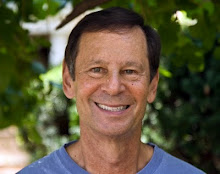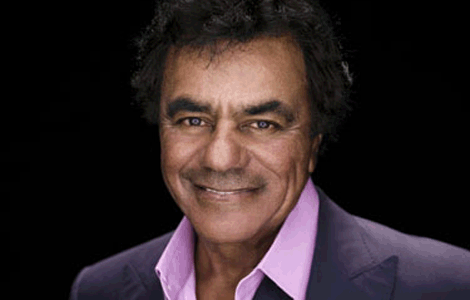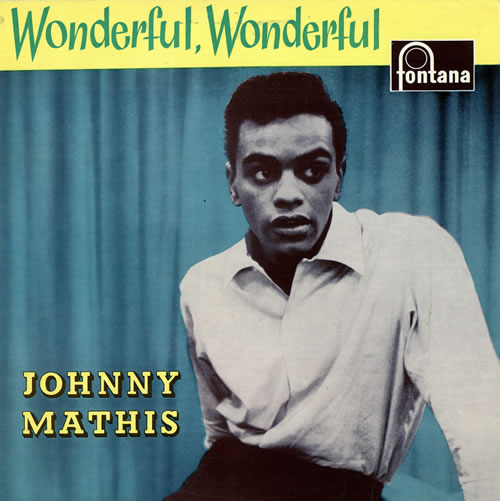JOHNNY MATHIS: STILL “WONDERFUL, WONDERFUL”
|
|
|
March, 2011 |
 A couple of months ago, I was looking through a listing of upcoming shows at the Kravis Center in Palm Beach, Florida. Lo and behold, scheduled for March 2nd was Johnny Mathis in concert. For those of my generation, the music of Johnny Mathis was the backdrop for many a “make-out” party and slow dance. Mathis sang songs which two bygone girlfriends and I considered “ours,” and his version of “My Funny Valentine” was chosen as the first dance my new bride and I selected for our wedding more years ago than now seems possible. Indeed, as teen-agers in 1959, we had danced cheek to cheek to his version of “Small World” the summer we met.
A couple of months ago, I was looking through a listing of upcoming shows at the Kravis Center in Palm Beach, Florida. Lo and behold, scheduled for March 2nd was Johnny Mathis in concert. For those of my generation, the music of Johnny Mathis was the backdrop for many a “make-out” party and slow dance. Mathis sang songs which two bygone girlfriends and I considered “ours,” and his version of “My Funny Valentine” was chosen as the first dance my new bride and I selected for our wedding more years ago than now seems possible. Indeed, as teen-agers in 1959, we had danced cheek to cheek to his version of “Small World” the summer we met.
I had last heard Mathis at the Performing Arts Center in New Jersey about twenty-five years ago when he would have been about 50 years old, and was still in full command of his awesome vocal skills. In contemplating whether or not to see him again, part of me had the same hesitancy that many of us experience when offered the opportunity to see a performer we remember from our (long-ago) youth. I had the same ambivalence when I saw Frank Sinatra in concert at 65, and didn’t want to tarnish my memory of him by running the risk of hearing a sub-par performance. Well, Sinatra “delivered the goods” that evening at Carnegie Hall, and I was glad that I went. Despite some waning in his vocal skills, “Old Blue Eyes” was still a master performer whose huskier tones only added poignancy to his ballads.

Yes, but Mathis was now 76, and was never known for his showmanship in the way Sinatra, Tony Bennett, and some other purveyors of the “great American songbook” are. Johnny Mathis was simply a singer, and the possessor of a unique voice, a gift from the musical gods that is easily imitated but impossible to duplicate. Showmanship would not be able to carry the day, only that special sound. I called a couple with whom my wife and I frequently attend concerts and suggested that this was possibly our last chance to hear one of the signal performers of our time. “Yes,” one of our friends said, “but do you think he’ll be up to it?” I knew what she meant. After thinking it over, I told her that I thought he would be. After all, I believed that Mathis’s commitment to vocal excellence was such that he wouldn’t perform if he didn’t consider himself up to his own standards. I hoped I was right.
I shouldn’t have worried. The artist came out to much applause, looking hale and fit in a dark suit with an open-collared shirt. With no fanfare, he picked up the microphone, and launched into Gershwin’s, “Embraceable You.” For me, this was a most auspicious choice, since it was from my favorite Mathis album, “Open Fire, Two Guitars.” I was astonished. It was vintage Mathis. The voice was strong and unmistakable. He hit all the notes with what seemed like effortless ease. My wife and I looked over to our friends, and we all nodded in agreement. Johnny Mathis was still Johnny Mathis!
 Some of our younger readers may not be as familiar with the artistry of Johnny Mathis as are the boomers and pre-boomers. In his time, he was every bit as popular as Elvis Presley, and Mathis stands alone with only a very few (Tony Bennett, Barbra Streisand and Keeley Smith come to mind) active performers perpetuating the tradition they share with Ella Fitzgerald, Rosemary Clooney, Jo Stafford, Frank Sinatra, Bing Crosby, Dean Martin, Sammy Davis, Jr. and Nat “King” Cole. According to the liner notes from his box set, “A Personal Collection,” Mathis was the first performer to have a “Greatest Hits” album, and it remained on the charts for many years, as did “Heavenly” and “Warm”! More than 60 of his approximately 100 albums have been certified as either “gold” or “platinum.”
Some of our younger readers may not be as familiar with the artistry of Johnny Mathis as are the boomers and pre-boomers. In his time, he was every bit as popular as Elvis Presley, and Mathis stands alone with only a very few (Tony Bennett, Barbra Streisand and Keeley Smith come to mind) active performers perpetuating the tradition they share with Ella Fitzgerald, Rosemary Clooney, Jo Stafford, Frank Sinatra, Bing Crosby, Dean Martin, Sammy Davis, Jr. and Nat “King” Cole. According to the liner notes from his box set, “A Personal Collection,” Mathis was the first performer to have a “Greatest Hits” album, and it remained on the charts for many years, as did “Heavenly” and “Warm”! More than 60 of his approximately 100 albums have been certified as either “gold” or “platinum.”
Simply stated, Johnny Mathis is “a singer’s singer,” and has been properly recognized as such by many of his contemporaries. The sometimes tactless Frank Sinatra (who disparagingly referred to Mathis as “The African Queen,”) once damned him with the faintest of praise saying, “yeah, he sings good, but who wants to listen to that shit?” Apparently many people did and still do. In a more generous moment, Sinatra said, “His voice is one of the most distinctive and instantly recognizable in the world. He epitomizes class and romance.” That tribute was more becoming of Sinatra and more befitting to Mathis. The late Bing Crosby referred to Mathis as “The master song salesman,” and the late host of The Tonight Show, Johnny Carson, called him “The best ballad singer in the world.” Barbra Streisand, who did a memorable West Side Story duet with Mathis (“One Heart,” and “I Have a Love,”), said he has “always been one of my favorite singers.” The late Ray Charles, had requested that his duet with Johnny Mathis (“Somewhere Over the Rainbow”) be played at his memorial service, is a high tribute from one of the most eclectic and successful song stylists of our time.
What is it that has made Johnny Mathis not only so popular, but enduring? From a purely technical standpoint, Mathis was born with a special gift, recognized by his parents, and honed by musical lessons at age 13 with vocal coach, Connie Cox. Mathis gave up a shot at the Olympics (he high-jumped 6’5 ½” as a college freshman) for a career as a vocalist, and the musical world is all the richer for it. I first heard and saw Mathis in the movie, “Lizzie,” in which he appeared as a nightclub singer performing the jazzy, “Warm and Tender,” as well as his soon-to-be classic, “It’s Not For Me to Say.” While he looked pained as he sang on-screen, it was clear that we were witnessing the debut of a special talent. One of the things that distinguished Mathis among his contemporaries was his vocal range. Although a self-described “middle” tenor, Mathis is able to seamlessly move from the very highest notes to unusually warm lows. While he is certainly able to sing falsetto, most of his high notes are in “unbroken” tenor tones. This ability is rare among male vocalists, and usually present only in younger singers. The early Sinatra could hit highs and lows effortlessly, but his high range dropped off noticeably by the end of the 50’s, a casualty of too much smoking and drinking. Bing Crosby lost much of his upper register early on, and the still great Tony Bennett has a difficult time with lower notes. Mathis is quoted as saying, “I could sing high and most men don’t sing high, and through my studies …I learned to sing softly high, and that is very difficult, and that’s the way my whole vocal persona developed.” Not surprisingly, the singer articulated the thing that makes him so very special. He makes the difficult sound simple.
Listen to Mathis on songs like “Tonight,” “Wild is the Wind,” and “I’ll be Seeing You,” and you’ll see what I mean. (As an aging folk-singer, I must confess that while I spent my younger days singing “If I had a Hammer,” with idealistic fervency, I’d be working on “Wonderful, Wonderful” in the shower.) The time has long since passed when “standard” songs charted on the “top forty,” but, back in the late 50’s and early 60’s, songs like “Wonderful, Wonderful,” “It’s not for me to Say,” “A Certain Smile,” and (his first #1 hit) “Chances Are,” were among the most popular songs in the country. According to the liner notes from his box set, “A Personal Collection,” Mathis was the first performer to have a “Greatest Hits” album, and it remained on the charts for many years, as did “Heavenly” and “Warm”! More than 60 of his approximately 100 albums have been internationally certified as either “gold” or “platinum.”
The potency of his influence can best be measured by the reverence with which he is regarded by contemporary singers of a younger generation. Gershwin chronicler and eponymous cabaret singer at “Feinstein’s at the Regency,” Michael Feinstein, (whose voice is often compared to Mathis), acknowledges the debt. In a 2009 interview with the Los Angeles Times, Feinstein said, “A lot of people compare me to Mathis, which has a always been the greatest compliment anyone could pay me. I never heard a Johnny Mathis record that wasn’t first-rate, and there are very few people I am able to say that about. Even Frank Sinatra made some terrible records, but Johnny Mathis has never compromised himself. He really knows what he’s about, and that is why he has survived.”
I am pleased to report that Johnny Mathis has not only survived, but he has prevailed. Apart from a few short tributes to the venue, his (28-piece) orchestra, and the audience, Mathis simply went from song to song. (Just imagine the commitment to quality—not to mention the expense—of providing such a large orchestra!) As indicated above, Mathis is more of a singer than an entertainer, and really all he needs to do in order to entertain is sing. And his music was not merely mired in the past. While he did perform some of his most familiar songs (e.g. “The Twelfth of Never,” “Chances Are,” and “Gina,”), he also sang some of his more recent songs such as the haunting “99 Miles from L.A.,” and a medley of Brazilian numbers accompanied by his guitarist, ending with the up-tempo song, “Brazil.” There were two special moments in the show for me. One was when Johnny began a very familiar song with its seldom-heard verse. See if you recognize the song from the verse:
“Though we try to be masters of our souls and captains of our fates, it’s the lucky ones who achieve their goals, while others have to wait. Our destiny is mostly bought and paid for us, the really big decisions all are made for us.”
Give up? Most of the audience was surprised as well when he segued into “So, it’s not for me to say you love me, etc.” Not surprisingly, they were delighted, and applauded the chorus. The other song was one that is so distinctly Mathis, that it is hard to think of anyone else singing it: the great Errol Gardner standard, “Misty.” Anyone who has ever heard Johnny Mathis perform the song live or on record knows how he returns from the instrumental break to sing the impossibly high “on my own.” His voice begins almost inaudibly, and seems to come from nowhere as it soars over the instruments while he moves the microphone closer to his mouth. The entire audience seemed to be awaiting this moment. This was the litmus test, the money shot. Could he still do it? Would he? The answer was a resounding “yes,” and the audience broke into applause, something one rarely hears in the middle of a song. Yes, Mathis still had it, and—to borrow from another of his songs—it’s ours to share.
To be fair, there were certain songs that had been lowered half a step, and others on which he went for a safer (i.e. lower) ending. But, for the most part, it was Johnny as he had always been. If you closed your eyes, it was fifty years ago, and we were all as young as he sounded.

*********************************************
As for favorite albums I’d recommend, five for starters. As mentioned above, my first choice remains, “Open Fire, Two Guitars,” from 1959. The two guitarists, by the way, are the highly regarded Al Caiola and Tony Mattola. His “16 Most Requested Songs” is also a “must,” as is his As a third album, I’ll pick this one as an example of Mathis as a concert performer: “Johnny Mathis Live” from 1985. Fourth is his 1958 Christmas album, called (appropriately enough) “Merry Christmas.” The original LP consisted of two sides, the first containing popular songs, including the marvelous “I’ll be Home for Christmas,” and “Silver Bells.” The second side is all religious songs, including breathtaking versions of “The First Noel,” and “Silent Night.” This is my favorite holiday album of all-time, bar none. (When you get it, it may well become one of yours, and might even prompt a few conversions.) Lastly, there is both a CD and DVD of his 50th Anniversary Celebration from 2006. This will demonstrate to the skeptics among you that Johnny Mathis not only endures, but continues to excel. Mathis was fortunate to have mostly recorded on Columbia Records (and, from ’63-’67, Mercury), and even many of his earlier LPs had that great “360” sound. (All the albums cited above are available on CD.) Because he always recorded with a large orchestra (“Two Guitars” notwithstanding), audiophiles can find much to enjoy in listening to him. Sit back and listen and—if you have the chance—see him in concert. Trust me, Johnny Mathis lives!
10 thoughts on "JOHNNY MATHIS: STILL “WONDERFUL, WONDERFUL”"
Leave a Reply
Stereo Times Masthead
Publisher/Founder
Clement Perry
Editor
Dave Thomas
Senior Editors
Frank Alles, Mike Girardi, Russell Lichter, Terry London, Moreno Mitchell, Paul Szabady, Bill Wells, Mike Wright, and Stephen Yan,
Current Contributors
David Abramson, Tim Barrall, Dave Allison, Ron Cook, Lewis Dardick, John Hoffman, Dan Secula, Don Shaulis, Greg Simmons, Eric Teh, Greg Voth, Richard Willie, Ed Van Winkle, Rob Dockery, Richard Doran, and Daveed Turek
Site Management Clement Perry
Ad Designer: Martin Perry





Dear John,
Thank you for this exceptional article on one of the finest singers of our time. I was in high school when Johnny Mathis first came onto the musical scene & he was indeed the quintessential accompaniment for dance music & make-out music, and just for listening. More importantly his beautiful voice has continued to bring joy & pleasure to fans of all ages for more than 6 decades. You mentioned some of his greatest of many great hits, but let us not forget, “When I am with You”. Thanks again for this well deserved tribute to Mr. Johnny Mathis.
James-
I just came across your kind comments on my piece on Johnny Mathis. It’s funny that you single out (and properly so) “When I am with you.” On a personal note, after losing my wife of many years in 2019, I was fortunate to meet a wonderful woman with whom I now married. I told her that she brought to life the special line from that song, “It’s not just for what you are that makes me love you as I do, but for what I am when I am with you”. Thanks for reminding me of it, and best wishes.
John
i totally agree with the assessment given here johnny was by far my favorite singer.
if one was to read his life story they would see what a fine gentleman he is.
i had the pleasure to be at one of his concerts in florida? he did not fail me.
i am 1year and 10 days older than johnny and listen when i can to his wonderful wonderful voice.
Paula-
Thank you for your kind words on my piece on the enduring Mr. Mathis. It’s “wonderful, wonderful” that you, being a year and ten days Johnny”s senior, continue to thrive.
Bless you, and best wishes,
“The other” Johnny
One of my favorite singers of all time! I saw Johnny Mathis at a concert in Florida along with so many other great singers. He was of course my favorite of them all!!!
Joyce-
As I think you could tell from my piece, I very much agree. Best wishes,
John
In Amsterdam in around 1976 I had the pleasure of going to his appearance and the I could really witness How great singer he is with his sophisticated marvelous timbre in his voice. He is a very decent gentleman with no air of being better than anybody else.
Loek-
Thank you for your comments. I agree with you that the special timbre of Johnny Mathis’s voice is what sets him apart from all popular singers, past and present. Best,
John
Listen to Johnny’s Spanish and Brazilian type songs to get to hear some really high notes!Wow!He sold albums like others sold singles!
Dennis-
I agree. His Spanish and Brazilian songs are great. The man could do just about anything he set his mind to. That said, I’m just as glad he stayed way from “Hip Hop.” Best,
John